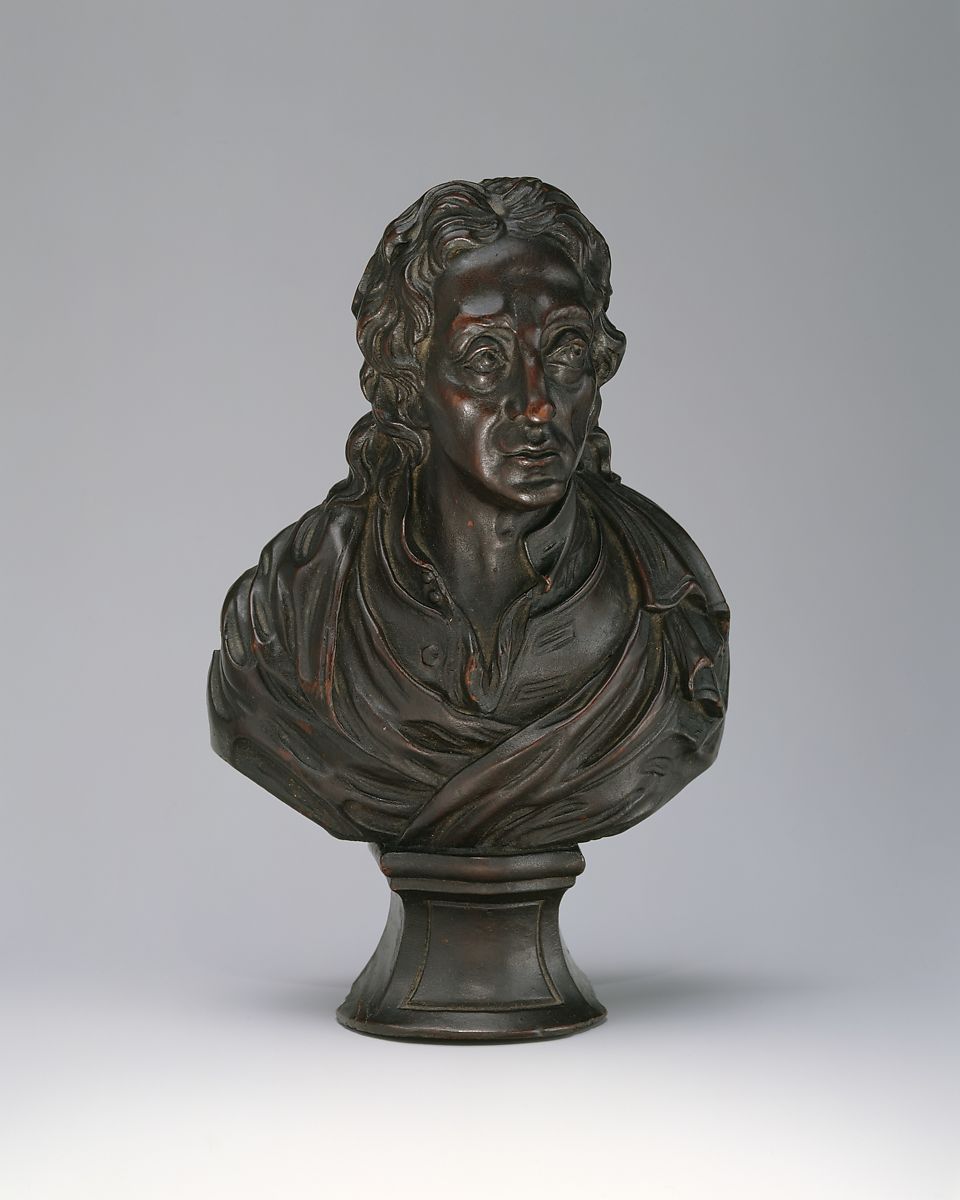Found: a Key to Understanding Hobbes’ Influence on Locke (and Locke’s Character)
A recent discovery casts new light on the influence of Thomas Hobbes on John Locke, and on the kind of person Locke was.
The discovery was made by Felix Waldmann (Cambridge University), who writes about it in The Journal of Modern History.

[Bust of John Locke]
Waldmann did not find the copy of Leviathan, but in his investigation he found something else: a report of an interview by Pierre Des Maizeaux of James Tyrrell, who was a longtime friend of Locke’s. Waldmann writes:
Tyrrell was closer to Locke than virtually any other member of his circle. Locke stayed in Tyrrell’s home for several weeks between 1679 and 1683, entrusted Tyrrell with the care of many of his possessions and papers when he entered into exile between 1683 and 1689, and corresponded with Tyrrell for most of his adult life. Their connection was so well known that Tyrrell was believed by one contemporary to have authored the anonymous, fawning obituary in Collier’s re-edition of Moréri’s Le Grand Dictionnaire Historique.
In the interview, Tyrrell reveals that Locke had a copy of Leviathan and studied it closely. He also paints a rather unflattering portrait of Locke. Here’s an excerpt: (in his accounting of the interview, Maizeaux refers to Tyrrell as “Mr. . .” and Locke as “Mr. L”):
Mr. . . has told me that he had particularly known Mr. L, and that he had preserved strong links with him, save for the last twenty years of his [sc. Mr. L’s] life. When he [sc. Mr. L] was at Oxford, he did not study at all; he was lazy and nonchalant, and he amused himself with trifling works of wit. The English translation of Voiture’s Lettres was all his delight, and occupied him the most. He despised Science and Erudition. Nonetheless, he almost always had the Leviathan by H. on his table, and he recommended the reading of it to his friends. Mr . . . bought it on his recommendation; however he [sc. Mr. L] later affected to deny, in the future, that he had ever read it. He prided himself on being original, and he scorned that which he was unable to pass off as his own. This inclination often made him reel off, with great ceremony, some very common claims, and recite, pompously, some very trivial maxims. Being full of the good opinion that he had of himself, he esteemed only his own works, and the people who praised him…
He was avaricious, vain, envious, and reserved to excess. He lost his temper with the greatest ease… He took from others whatever he was able to take, and he profited from them, remaining very secretive and reserved with them, even over trifling matters.
Tyrrell also accuses Locke of plagiarising works he wrote about money, stealing others’ research without credit, and refusing to publish others’ work on subjects he thought he might write about later.
Waldmann summarizes the research in an essay at the Times Literary Supplement.
In response to the yesterday’s post about philosophical friendships, someone tweeted about acknowledging “the value of philosophical frenemies.” I’m not sure they had in mind the value of such relationships to historians of philosophy, but Waldmann’s research demonstrates it.
UPDATE (6/28/21): A very contemporary account of the research.



Des Maizeaux’s (or Tyrrell’s) description of Locke is quite contrary to the impression of Locke as a person that I take from reading his great Essay on Human Understanding. To me he comes across as a very curious, humane and thoughtful person (though a little gullible and not free of all of the prejudices characteristic of his time). He has a better sense of humor than any other philosopher I have read, from any era.
There is a good deal of interesting historical background in this journal article on which the more sensationalistic TLS story is based, but the claim itself is based on a second hand (and unusually critical) anonymous account of Locke, which the Waldmann surmises was from a sometime friend (Tyrell) of Locke in his youth.
Other than the putative recollection of a disaffected former friend some 50 years after the alleged fact, when T was quite aged (77 or 78) – or of DesMaizeaux’s second hand summary – there is no corroboration of the Oxford story. So this might be a rather small brick in the wall arguing for L as a reader of Hobbes, but I don’t see that there is yet any reliable evidence of any significant influence of Hobbes on Locke.
Right. The more significant evidence would be that Locke more or less just rehashes Hobbes and is generally a second-rate hack whose best ideas are found more clearly and convincingly expressed in earlier, lesser-known writers.
I’m not generally sympathetic to the “we need to reevaluate the canon” line, but then I think of Locke and realize that there’s some truth to this.
Whoa there big fella. Going to need more than that to throw Locke into the bin.
Lol. Fair enough. To get in the mood to toss Locke in the bin, I recommend spending an afternoon reading Locke.
Don’t know much about history.
Don’t know much epistemology.
But I do know Locke’s Essay well.
For those who don’t, just let me tell:
You could learn about innate ideas,
Sensation, perception, reflection as well.
You could learn about memory too;
Personal identity is in Book Two.
There’s substance, and powers, and thoughts on relations.
Effect and cause, lots of innovations.
Natural kinds and how our languages work.
You’d be surprised. This guy’s no jerk.
So when I hear someone say, “He’s a hack,”
I think you’re nuts! You’re just talkin’ smack.
Give Locke a try. He’s truly great.
And get off your high horse. It’s never too late.
I like this!
And sure, ‘hack’ is too much. Perhaps ‘overrated’ is better. ‘Truly great’ he is not, if we are making comparative judgments with respect to philosophers who are typically read in the course of an undergraduate education, and many who are not. Why do we read Locke and not (say) Plotinus, who was much more influential and much more interesting? There are a number of incredible early medieval philosophers who are not generally taught to undergrads. I doubt many undergrads read Avicenna or Maimonides. In the modern period, I doubt Hobbes is included in most undergrad modern philosophy courses, but his work is much deeper and more original than Locke’s. There are quite a few Renaissance philosophers who are also great that we do not assign to undergrads in a history sequence.
So sure, there should be some Locke scholars out there. But the emphasis we place on him is outpaces how worthwhile it is to study him. Locke pales in comparison to other philosophers who are considered central figures in the history of philosophy (Plato, Aristotle, Plotinus, Augustine, Aquinas, Spinoza, Leibniz, Rousseau, Hume, Kant, Hegel, and so on). The work of these other philosophers is rewarding— one can always go deeper with it, puzzle over something, read more and think ‘ohhhh, wow, *this* is how he deals with this issue’ … not Locke. It’s much more superficial, in some ways easier to understand but far less rewarding. So sorry if I’m being obnoxious. There’s no call to insult Locke. But I do wish we would place less emphasis on the modern period, or expand it to include some scholastic and Renaissance figures, and within the modern period, less emphasis on Locke.
Also, it’s worth mentioning that one could replace Locke with Anne Conway in an early modern class, whose work is brilliant, original, and much more worthwhile.